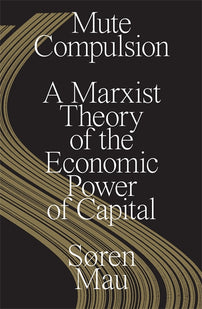Michael Heinrich on Mute Compulsion
Michael Heinrich on Søren Mau's new book, Mute Compulsion.

I first met Søren Mau in November 2017, at the annual conference in London of the journal Historical Materialism. When we talked after his paper presentation, he asked me if I knew of any literature that dealt more specifically with the Marxian concept of the ‘mute compulsion of economic relations’. I couldn’t think of a single title. Søren then told me that he wanted to write a dissertation on this concept. At first I was a bit perplexed. I had often myself quoted the ‘mute compulsion’ that Marx talks about in the chapter on ‘so-called primitive accumulation’, and had also used it in many discussions. The idea behind it – that under certain circumstances it is not persons but economic conditions that exert com- pulsion on formally free workers – seemed almost self-explanatory to me. It took only two or three sentences to make clear what was meant. Until now, it had never occurred to me that this concept might need a separate analysis. My surprise was similar to that in a game of chess when, in an opening that has been analysed in most variations up to the fifteenth or twentieth move, one is confronted with an innovation on the fourth. Either such a move is terribly stupid or it is insanely good. As I realised fairly quickly, Søren’s idea was not stupid at all. This ‘mute compulsion’ was of central importance in the contrast between personal relations of domination such as slavery or serfdom in pre-capitalist modes of production, and the impersonal domination of legally free wage labourers by which Marx characterises the capitalist mode of production. That alone should be reason enough to look at it in more detail. The only astonishing thing was that no one had done so before.
My second big surprise came about a year and a half later. I had stayed in touch with Søren, we had discussed different issues now and then, and I had agreed to participate in the defence of his thesis at the University of Southern Denmark. In the spring of 2019, I got to see his entire dissertation, written in English, for the first time. Far from being a narrow, philological discussion of the term ‘mute compulsion’, Søren’s analysis was much broader. He presented mute compulsion as a key component of the specifically economic ‘power of capital’, a power based on altering the material conditions of social reproduction. For his examination of the question, already much discussed, of how capitalist relations repeatedly reproduce themselves despite all crises and contradictions, Søren had named a third type of power relations alongside those based on violence and those based on ideology. While the first two have a direct effect on people, this third type asserts itself indirectly by reshaping people’s economic and social environment.
Søren’s work is now available in revised form as a book. It is dedicated to a detailed investigation of this specific ‘power of capital’. The various elements of a theory of this power are reconstructed from Marx’s critique of political economy in his manuscripts written after 1857. The results of this reconstruction do not refer to a concrete capitalist society; they are located on the level of representation of the ‘ideal cross-section’ of the capitalist mode of production, namely the level of abstraction on which Marx locates his own analysis, at the end of the manuscript for the third book of Capital. On this level, everything is analysed that necessarily belongs to the capitalist mode of production, regardless of its respective historical manifestation – and here this ‘mute compulsion’ is inherent in every case.
However, Søren’s investigation is not only about contributing to the elucidation of Marx’s critique of political economy or completing it. This already becomes clear in the second part of his three-part work. Starting from Marx’s conception of proletarians who can dispose of their life but are cut off from the necessary conditions of this life, Søren shows how biopolitical questions raised by Michel Foucault and Giorgio Agamben are inherent in Marxian analysis from the beginning, even if they are not called that. Also in the second part, the ‘power of capital’ based on ‘mute compulsion’ is examined with regard to the production of social differences on the basis of gender and racist attributions – which brings us directly to important current debates.
The third part of the work, which deals with the dynamics in which the power of capital is expressed, also shows the contemporary analytical relevance of Søren’s study. The real subsumption of labour under capital is the central category here. Søren’s use of this concept, however, differs considerably from the usual discussion: he deals with the real subsumption of agriculture, which highlights consequences for capital’s relationship to nature; the logistics revolution of the 1970s, which was central to globalisation tendencies in the last third of the twentieth century; and capital’s tendency towards crisis and production of a surplus population – all of which are issues at the heart of any fundamental confrontation with capitalism.
Reading this work is certainly not easy going. However, it soon becomes clear that the effort required does not get bogged down in the purely conceptual. It unfolds precisely the critical potential that is the necessary prerequisite for a social practice that aims to overcome domination and exploitation.
This is an edited version of Michael Heinrich's foreword to Mute Compulsion.
[book-strip index="1" style="buy"]